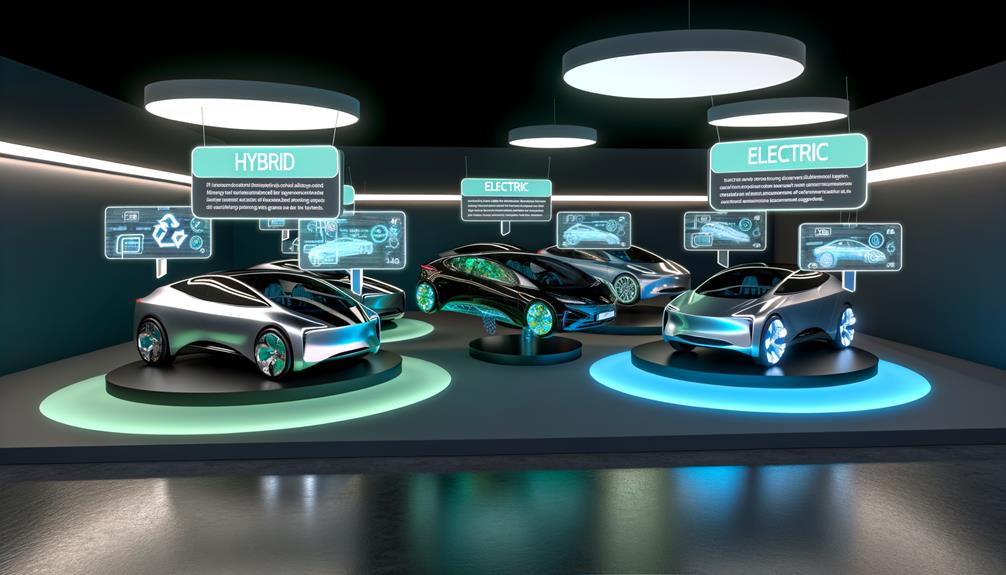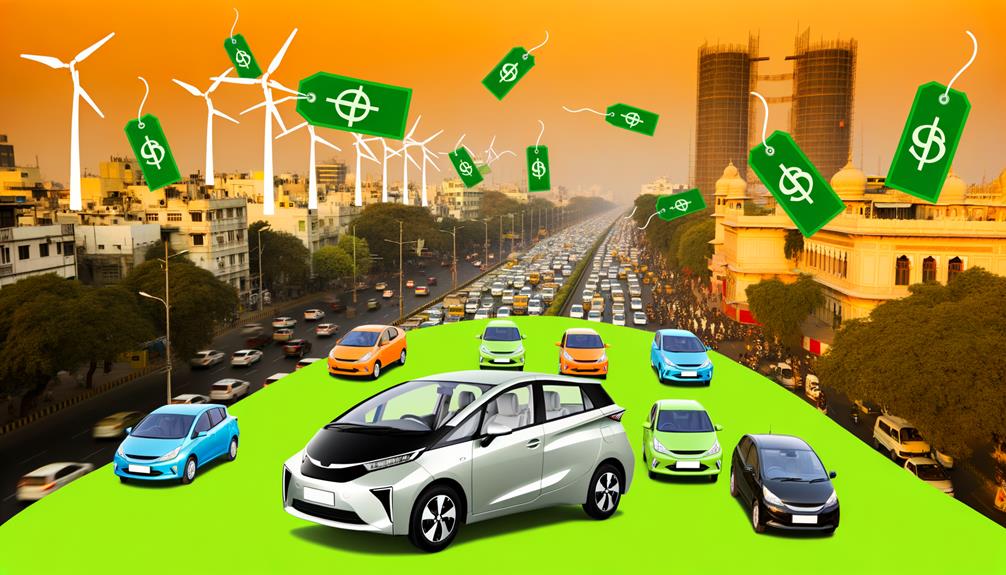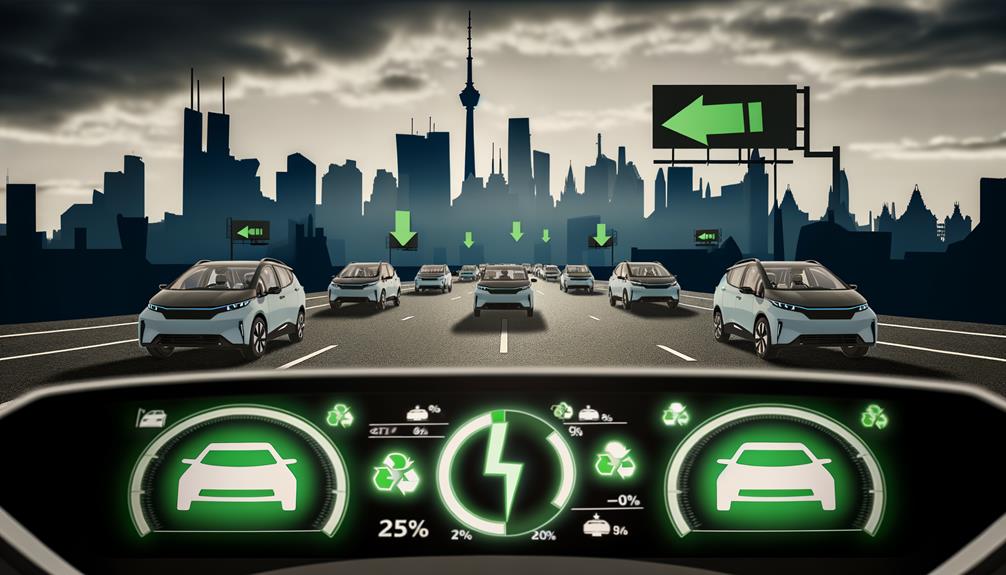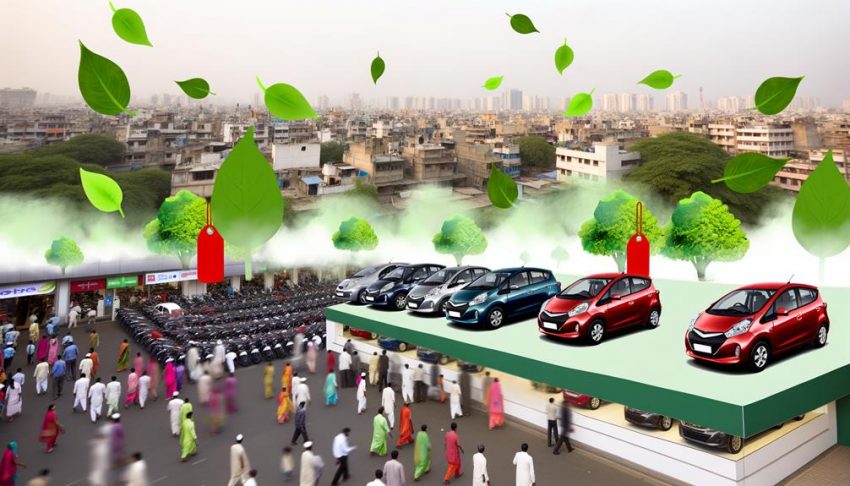You're probably wondering if hybrid car prices are really coming down in India. With recent government policy changes, like tax exemptions and waivers in states such as Uttar Pradesh, there's talk of up to a 10% reduction in costs. This could make hybrids more accessible and boost sales considerably. But how are market leaders reacting, and what does this mean for the future of hybrid vs. electric vehicles? As competition heats up and manufacturers adapt, the landscape might just shift in unexpected ways. Are we seeing the dawn of a more affordable, eco-friendly era?
Contents
Government Policy Changes
Recognizing the potential impact of government policy changes on the automotive market, the Uttar Pradesh government has waived levies on hybrid cars, leading to a remarkable price reduction of approximately 10% for these vehicles. This policy alteration, announced via a July 5 notification, also includes registration tax exemptions for hybrid cars, aligning with similar incentives previously granted to electric vehicles. The immediate effect is a substantial decrease in the upfront cost, making hybrid cars more financially accessible to a broader range of consumers.
By mitigating the financial barrier, Uttar Pradesh aims to stimulate the adoption of environmentally friendlier transportation options. Hybrid vehicles, which combine internal combustion engines with electric propulsion, offer a bridging solution for consumers wary of fully electric vehicles. The policy is expected to greatly incentivize the sale of hybrid cars within the state, likely boosting overall market demand.
With Toyota commanding an 85% market share in India's hybrid sector, this governmental move is poised to solidify their dominance. Models like the Hycross and Hyryder SUVs, already popular, could see even higher sales volumes due to the price reduction. Analysts suggest that the successful implementation of this policy in Uttar Pradesh could serve as a blueprint for other states. If other states follow suit, the cumulative effect could lead to a nationwide shift towards hybrid and electric vehicles, aligning with India's broader environmental goals.
Impact on Market Leaders
You're likely to see a significant shift in the hybrid car market as Toyota, with its 85% share, stands to benefit immensely from Uttar Pradesh's levy waivers, boosting sales of models like the Hycross and Hyryder SUVs. The 10% price cut on hybrids is poised to intensify competition, impacting market leaders such as Toyota and Maruti Suzuki, whose shares have already surged by 5.5% post-announcement. With strong hybrids making up less than 3% of total car sales in Q1 2024, this price reduction could catalyze substantial market share gains for these leaders amidst rising competition from Hyundai and Mahindra.
Toyota's Market Dominance
Toyota's commanding 85% market share in India's hybrid vehicle sector underscores its formidable presence and influence in this burgeoning market. The company's market strategies have been essential, focusing on popular models like the Hycross and Hyryder SUVs, which align perfectly with consumer preferences for fuel-efficient and environmentally friendly vehicles. These models aren't just popular; they're flying off the shelves, proving Toyota's adeptness in reading and responding to market demands.
Sales projections suggest that Toyota's dominance is set to grow even more, especially with recent favorable policy changes in Uttar Pradesh that waive levies on hybrid cars. This policy shift is expected to substantially boost the sales growth of Toyota's hybrid models, reinforcing its market leadership.
Toyota's effective lobbying efforts have played an essential role in shaping these favorable government policies, further cementing its dominant position. As the hybrid vehicle market expands, you can expect Toyota's leadership to spur innovation and competition among other manufacturers. This dynamic will likely lead to a more robust hybrid vehicle segment overall, benefiting consumers through increased choices and potentially lower prices.
Competitive Market Shifts
While Toyota's dominance in India's hybrid vehicle market remains strong, recent policy changes are catalyzing competitive market shifts that could impact all market leaders. The Uttar Pradesh policy waiving levies on hybrid cars is set to make them approximately 10% cheaper. This price reduction is expected to stimulate consumer behavior shifts, making hybrids a more attractive option for budget-conscious buyers.
For Toyota, which holds an 85% market share, this could mean increased sales of its popular models like Hycross and Hyryder. However, the competitive landscape is also evolving. Shares of Maruti Suzuki surged by 5.5% following the tax exemption announcement, reflecting a positive market response and signaling potential gains for other players.
The anticipated spike in demand for hybrids—projected to double in the next five years—will push market leaders to rethink their marketing strategies. This includes sales channel diversification to capture a broader customer base. Domestic competitors like Tata Motors and Mahindra, concerned about the preferential treatment of hybrids, might also accelerate their entry into this segment, intensifying market competition.
In this shifting landscape, staying ahead will require agility in adapting to consumer behavior shifts and evolving marketing strategies to maintain or enhance market positions.
Hybrid Vs. Electric Vehicles

Steering through the landscape of hybrid vs. electric vehicles in India reveals a complex dynamic shaped by market share, tax policies, and evolving consumer preferences. As of Q1 2024, strong hybrid cars accounted for less than 3% of total car sales, while electric vehicles comprised nearly 4% of the market. This disparity is heavily influenced by the federal sales tax structure—electric vehicles benefit from a mere 5% tax, whereas hybrids face up to a staggering 43% tax. This significant tax differential directly impacts hybrid technology's overall pricing and, consequently, consumer behavior.
However, recent policy changes in regions like Uttar Pradesh, which include waivers on levies for hybrid cars, could tilt the scales. These incentives are likely to make hybrid vehicles more competitively priced compared to their electric counterparts. Analysts suggest that with these changes, and the increasing availability of hybrid options, hybrids might capture a larger market share, especially as consumers become more eco-conscious. This shift could have a significant environmental impact, as hybrid technology offers a middle ground between conventional combustion engines and fully electric powertrains, potentially reducing overall emissions.
The ongoing debate between hybrid and electric vehicle strategies among domestic automakers underscores the potential for future policy shifts. These shifts could further influence the pricing dynamics in the market, making it imperative for consumers to stay informed about both technologies. As the market evolves, understanding these nuances will help you make more informed decisions, balancing cost, technology, and environmental impact. Traversing this landscape requires a keen eye on policy changes and market trends to guarantee you get the best value for your money.
Reactions From Competitors
The ongoing debate between hybrid and electric vehicle strategies has led to varied reactions from competitors in the Indian automotive market. Domestic automakers like Tata Motors and Mahindra have openly opposed the recent tax reductions on hybrid vehicles, concerned that it might skew government support away from electric vehicles. Their reaction highlights apprehensions about market strategies and the potential shift in competitive advantages.
Meanwhile, Hyundai is gearing up to launch its first hybrid car in India by 2026, signaling a strategic move to tap into the hybrid segment despite the fierce competition. Mahindra, on the other hand, is actively exploring hybrid technology options to adapt to market shifts and meet evolving consumer preferences for more eco-friendly options.
Competitors' reactions to the price cuts on hybrid cars are mixed:
- Support for market growth: Some players see the price reduction as a catalyst for overall market expansion, potentially driving up demand across the board.
- Concerns over EV investments: Others worry that this shift might divert essential investments away from electric vehicles, hindering long-term sustainability goals.
- Strategic adaptation: Companies like Mahindra are looking to balance their portfolios by incorporating hybrid technology to stay competitive.
- Consumer-centric approaches: Automakers are closely monitoring consumer preferences, which are increasingly leaning towards environmentally friendly and cost-effective solutions.
- Government policy impact: The supportive policies for hybrid vehicles are reshaping market strategies, prompting companies to reassess their competitive advantages.
As the competitive environment intensifies, established players and new entrants are re-evaluating their market strategies to align with government policies and shifting consumer preferences. The varied reactions underscore the dynamic nature of the Indian automotive market and the need for companies to remain agile and responsive to these changes.
Future Market Trends

Amidst the evolving landscape of the Indian automotive market, hybrid vehicles are poised for substantial growth, driven by strategic policy changes and consumer preferences. With Uttar Pradesh's recent policy waiving levies on hybrid cars, making them about 10% cheaper, you're likely to see a surge in hybrid car sales. Analysts forecast that government incentives, coupled with increasing consumer interest, will double hybrid vehicle sales in the next five years.
Let's break down the factors influencing this trend:
| Factor | Impact |
|---|---|
| Policy Changes | Lower purchase cost |
| Consumer Preferences | Shift towards eco-friendly cars |
| Government Incentives | Enhanced affordability |
| Rising Fuel Prices | Increased cost-effectiveness |
| Technological Advancements | Improved battery tech and range |
The environmental impact of hybrid vehicles is another significant factor driving their growth. As awareness of climate change intensifies, more consumers are choosing hybrids for their lower emissions and better fuel efficiency. This shift in consumer preferences aligns with broader market forecasts, predicting a substantial rise in hybrid vehicle market share by 2025.
Discounts reaching up to 10 lakh INR on popular models are making hybrids more competitive, getting more consumers to evaluate them over traditional gasoline vehicles. The anticipated increase in hybrid model availability, along with advancements in battery technology, will further support this upward trend.
Recent Price Reductions
Several recent developments have markedly reduced the prices of hybrid cars in India, making them more accessible to consumers. These changes are primarily driven by new policy measures and competitive market strategies, which considerably influence consumer preferences and price elasticity.
- Policy Changes in Uttar Pradesh: The state has waived levies on hybrid cars, resulting in approximately a 10% reduction in their prices.
- Discounts on Popular Models: Notable price cuts on models like the Innova and Camry have reached up to 10 lakh INR, making these hybrids more competitive.
- Registration Tax Exemptions: Announced in July 2023, these exemptions further reduce the overall cost of hybrid vehicles.
- Toyota's Market Influence: Dominating 85% of the hybrid market share, Toyota's successful lobbying has led to favorable pricing.
- Special Financing and Promotions: Various financing options and seasonal promotions are now available, encouraging hybrid car purchases.
The policy changes in Uttar Pradesh are a considerable driver, waiving levies that make hybrid cars about 10% cheaper. This directly caters to consumer preferences for more affordable, environmentally friendly vehicles. Additionally, the hefty discounts on popular models like the Innova and Camry, reaching up to 10 lakh INR, have greatly lowered the entry barrier for many potential buyers.
Registration tax exemptions introduced in July 2023 are another critical factor. By reducing the total cost of ownership, these measures enhance the market demand for hybrid cars. Toyota, holding an 85% market share, has been a key player in lobbying for these advantageous changes, reflecting a deep understanding of price elasticity and consumer needs.
Moreover, the introduction of special financing options and seasonal promotions adds another layer of incentive, making it easier for consumers to switch to hybrids amid these price reductions. This multifaceted approach is proving effective in reshaping the hybrid car market in India.
Technological Advancements

You'll find that technological advancements regarding hybrid vehicles have greatly transformed their performance and efficiency metrics. One of the most significant areas of improvement is in battery innovations. Modern hybrids now feature advanced batteries that offer enhanced performance and longevity. This translates to longer electric-only driving ranges, reducing the frequency of fuel usage and cutting down on emissions.
Regenerative braking systems have also seen substantial improvements. These systems now recover more energy during braking, which is then stored in the battery for later use. This not only boosts overall efficiency but also extends the lifespan of the braking components. For instance, some newer models can recover up to 70% of the energy that would otherwise be lost during braking, making your hybrid vehicle much more energy-efficient.
The integration of lightweight materials is another critical advancement. By utilizing materials such as high-strength steel, aluminum, and carbon fiber, manufacturers have managed to reduce the overall weight of hybrid vehicles. This reduction in weight directly contributes to improved fuel efficiency and better performance. A lighter vehicle requires less energy to move, which in turn means less fuel consumption and lower emissions.
Continuous research and development efforts are focused on optimizing hybrid propulsion systems. The goal is to make these systems more competitive with fully electric vehicles regarding cost and performance. The advancements in battery innovations, regenerative braking, and lightweight materials collectively enhance the attractiveness of hybrid vehicles, making them a viable alternative not just concerning environmental impact but also in cost efficiency.
These technological strides are certainly paving the way for more affordable and efficient hybrid cars in India, aligning with the global shift towards sustainable transportation.
Frequently Asked Questions
Are Hybrid Cars Going to Be Cheaper in India?
Yes, you'll see hybrid car trends favoring lower prices due to government incentives, making them about 10% cheaper. Electric vehicle competition and shifting consumer preferences for eco-friendly options further drive this cost reduction.
Will Hybrid Cars Lose Value?
Hybrid cars in India likely won't lose much value. Their depreciation rates are expected to be lower due to a stronger resale market and reduced maintenance costs. Government incentives and consumer demand for eco-friendly vehicles further stabilize their value.
Is It Worth to Buy a Hybrid Car in India?
Yes, it's worth buying a hybrid car in India. You'll benefit from significant cost savings and reduced fuel expenses. Plus, the environmental impact is lower, and the driving experience is enhanced with improved technology and performance.
Is the Government Reducing Tax on Hybrid Cars in India?
Yes, the government is reducing tax on hybrid cars in India. Recent tax incentives in Uttar Pradesh reflect government policies focused on environmental benefits, potentially encouraging other states to follow suit and boosting hybrid vehicle adoption nationwide.
Conclusion
You're likely to see hybrid car prices drop in India, thanks to new government policies like tax exemptions and levies waivers. This could mean a reduction of up to 10% in prices. With market leaders adapting and competition heating up, hybrids are becoming more affordable. This price shift, combined with ongoing technological advancements, will likely double demand in the next five years, making hybrids an attractive option for eco-conscious, fuel-efficient consumers.
